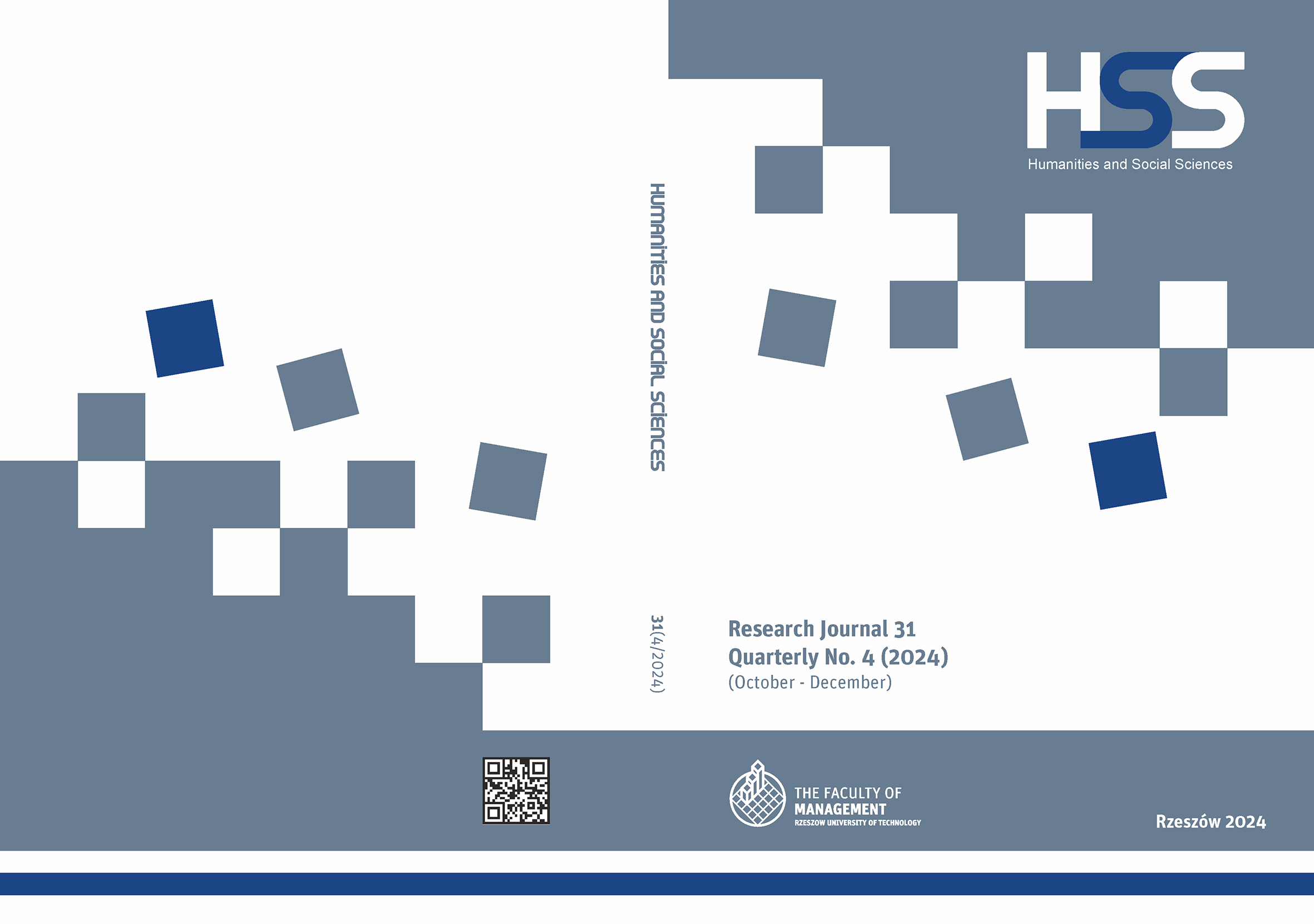Abstract
Academic freedom is part of the multi-faceted discourse on liberty. Enabling universities to fulfill their core mission of advancing knowledge is a fundamental element of pursuing academic freedom. The purpose of this article is to analyze the issue of academic freedom, including the conditions and processes involved in conducting research and accomplishing the objectives of higher education. Key factors in the process of knowledge production and commercialization include historical background, perception of independence paradigms, adopted university management models, and the size and structure of funding. Among the crucial premises for the commercialization of knowledge in higher education are the sense of community within the academic environment and accumulated past funding (related to the "Matthew Effect").
References
Barrow, R. (2009). Academic freedom: Its nature, extent and value. “British Journal of Educational Studies”, 57(2).
Barwicka-Tylek, I. (2009). Portrety wolności. Studium z historii idei i postmodernizmu „stosowanego”. Warszawa–Kraków: Wolters Kluwer.
Berggren, E. (2017). Researchers as enablers of commercialization at an entrepreneurial university. “Journal of Management Development”, 36. DOI: 10.1108/JMD-06-2016-0117.
Berlin, I. (1994). Cztery eseje o wolności. Warszawa: Wydawnictwo Naukowe PWN.
Butler, P., Mulgan, R. (2013). Can academic freedom survive performance based research funding. “Victoria U. Wellington L. Rev.”, 44.
Constant, B. (1992). Spory wokół wolności: idee stare i nowe. O wolności starożytnych i nowożytnych, „Arka”, 42.
Constant, B. (1980). Principes de politique [In:] Hofmann, E., Les „Principes de politique” de Benjamin Constant, Vol. 2.
ENQA et al. (2015). Standards and Guidelines for Quality Assurance in the European Higher Education Area (ESG), European Association for Quality Assurance in Higher Education. Brussels, Belgium.
Evans, D. (2011). Academic freedom and global health. “Journal of Medical Ethics”, 38. DOI: 10.1136/jme.2010.041251.
Gasset, J. (2004), Bunt mas. Warszawa: Spectrum.
Grimaldi, N. (2007), Dylematy wolności. Kraków: Wydawnictwo WAM.
Hicks, D. (2012). Performance-based university research funding systems. “Research policy”, 41(2).
Hugentobler, M., Müller M., Morrissey F. (2017). Private funding and its dangers to academia: an experience in Switzerland. “European Journal of Higher Education”, Vol. 7/2. DOI: 10.1080/21568235.2016.1275975.
Kinzelbach, K., Lindberg, S.I., Pelke, L., Spannagel, J. (2023). Academic Freedom Index – 2023 Update. Dostępne na: https://www.researchgate.net/publication/369109194_Academic_Freedom_Index_Update_2023.
Kotkin, J. (2020). The Coming of Neo Feudalism. New York: Encounter Books.
Lynch, K., Ivancheva, M. (2015). Academic freedom and the commercialisation of universities: a critical ethical analysis. “Ethics in Science and Environmental Politics”, 15(1).
Marginson, S. (2010). Higher education in East Asia and Singapore: rise of the Confucian Model. “Higher Education”, Vol. 61/5. DOI: 10.1007/s10734-010-9384-9.
Ménard C. (1995). Markets as Institutions vs Organizations as Markets: Disentangling Some Fundamental Concepts. “Journal of Economic Behavior and Organizations”, 28(3).
Mill, J.S. (2005). Utylitaryzm. O wolności. Warszawa: Wydawnictwo Naukowe PWN.
Miyata, Y. (2000). An empirical analysis of innovative activity of universities in the United States. “Technovation”, 20(8). DOI: 10.1016/s0166-4972(00)00024-9.
Montesquieu Ch. (1957). O duchu praw, t. I. Warszawa: Państwowe Wydawnictwo Naukowe.
North, D.C. (2002). Institutions, Institutional Change and Economic Performance. Cambridge: Cambridge University Press.
Nowak, P. (2014). Hodowanie troglodytów. Uwagi o szkolnictwie wyższym i kulturze umysłowej człowieka współczesnego. Warszawa: Kronos.
Nowak, P. (2023). Szkicownik mizantropa. Warszawa: Kronos.
OECD (2024). Spending on tertiary education (indicator). DOI: 10.1787/a3523185-en [Access: 02.01.2024].
Pinheiro, R. (2012). In the region, for the region. A comparative study of the institutionalisation of the regional mission of universities. Ph.D dissertation. Oslo: University of Oslo.
Popper, K. (2002). Logika odkrycia naukowego. Warszawa: Aletheia.
Przybyła, H. (2016). Kategoria wolności w myśli starożytne i średniowieczu [In:] Zagóra-Jonszta, U., Pęciak R., eds., Kategoria wolności w wybranych kierunkach myśli ekonomicznej. Katowice: Wydawnictwo Uniwersytetu Ekonomicznego w Katowicach.
Qian, X.-D., Xia, J., Liu, W., Tsai, S.-B. (2018). An Empirical Study on Sustainable Innovation Academic Entrepreneurship Process Model. “Sustainability”, 10(6). DOI: 10.3390/su10061974.
Röpke, W. (1942). Die Gesellschaftskrisis der Gegenwart, Erlenbach/Zürich.
Savvina, O. (2020). Academic Freedom and Contemporary Universities [In:] 4th International Conference on Culture, Education and Economic Development of Modern Society (ICCESE 2020). Atlantis Press. DOI: 10.2991/assehr.k.200316.147.
Scimago Institutions Rankings (2024). Overall Rank of OECD Universities [Access: 02. 01.2024]. Access on the internet: https://www.scimagoir.com/rankings.php?sector=Higher+educ.&country=OECD.
Spannagel, J., Kinzelbach, K. (2023). The academic freedom index and its indicators: Introduction to new global time-series V-Dem data. “Quality & Quantity”, 57(5). DOI: 10.1007/s11135-022-01544-0.
Utanova, U., Rajabov, K., Inoyatov, K., Marufbaev, B. (2021). Entrepreneurial Universities as a Modern Development Stage of the University 3.0 Concept. “Technology”. DOI: 10.14704/web/v18si05/web18281.
Vakhovskyi, L., Babichev, O., Ivchenko, T. (2022). Postmodernism and the Perspectives of University Education. “Postmodern Openings”, 13(3). DOI: 10.18662/po/13.3/498.
von Hayek, F.A. (2006). Konstytucja wolności. Warszawa: Wydawnictwo Naukowe PWN.
Wang, Y., Chen, Y., Li, W., Wang, T., Guo, L., Li-Ying, J., Huang, J. (2020). Funding research in universities: do government resources act as a complement or substitute to industry funding? “Economic Research-Ekonomska Istraživanja”, 33(1). DOI: 10.1080/1331677x.2020.1746189.
Wilkin, J. (2020). Znaczenie uniwersytetów w epoce postprawdy. „Nauka”, 1. DOI: 10.24425/nauka.2020.132622.


